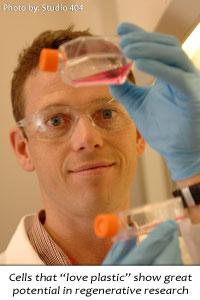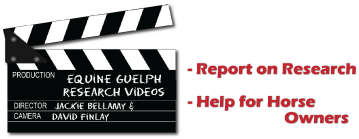Researcher Profiles
Dr. Thomas G. Koch
| View Dr. Koch's University of Guelph profile |
 |
Dr. Koch began his PhD studies in 2005 after completion of his DVM and advanced clinical training in large animal medicine and surgery, and has, in a short period of time, shown excellent research acumen in the form of primary publications and numerous review papers in the field of equine stem cell medicine. |
Dr. Koch has gained recognition as a leader in the field of equine regenerative medicine is evident by an increasing international profile and activity as an invited speaker. Dr. Koch was an invited keynote speaker at the first North American Conference on Equine Veterinary Regenerative Medicine and subsequently he became a founding committee member for the newly established North American Veterinary Regenerative Medicine Association (NAVRMA). Most recently he was an invited participant in a prestigious Havemeyer Conference on Equine Regenerative Medicine consisting of 25 select individuals recognized for their current and future contributions to the field. These opportunities to interact with other leaders in the field of regenerative medicine ensures that Dr. Koch's research program will remain at the forefront of scientific discovery and beneficial collaborations with premiere researchers will continually be established. Dr. Koch's broad and unique background with advanced clinical training in large animal medicine and surgery in addition to his research training greatly contribute to his ability to recognize unmeet clinical needs and successfully operate in the interface of translational medicine through interaction with clinicians and basic scientists.
Dr. Koch and colleagues pioneered the isolation of equine cord blood-derived mesenchymal stem cells and he has subsequently documented that these cells can be consistently isolated and that the cells may be a superior cell source for cartilage repair. This initial ground breaking work was supported by a PhD scholarship from the Danish Research Agency three years study abroad. During his PhD studies Dr. Koch was the co-applicant on numerous successful operating grants that further supported his research. These include funding from the Grayson Jockey Club Inc., Lexington, KY, Equine Guelph, and BioE Inc., MN. Upon completion of his PhD he was awarded a three-year 1 Million dollar competitive grant from the Danish Research Council for Technology and Innovation for a post-doctoral stipend and operating funds to investigate whether equine cord blood mesenchymal stromal cells is an allogeneic cell source for cartilage repair. Since 2005 Dr. Koch has been awarded $1,829,390 as PI or Co-applicant to support his innovative program of research.
Dr. Koch's past work has lead to the establishment of commercial company eQcell Therapies inc. that offers experimental cell-based therapies and cell storage/banking to the equine industry. Dr. Koch holds a minor non-controlling share in the company. The company was established with the intention of conducting research on currently applied equine treatment modalities in a veterinary practice setting and develop novel regenerative medicine solutions to the equine industry.
| Dr. Koch discusses his research in our special feature REPORT ON RESEARCH |
|
PEER-REVIEWED ARTICLE PUBLICATIONS:
1. Figueroa RJ, Koch TG, and Betts DH. Osteogenic differentiation of equine cord blood MSCs within coralline hydroxyapatite scaffolds in vitro. Vet Comp Orthop Traumatol, Accepted March 8, 2011. 0 citations.
2. Berg LC, Koch TG, Heerkens T, Besonov K, Thomsen PD, Betts DH. Chondrogenic potential of mesenchymal stromal cells derived from equine bone marrow and umbilical cord blood. Vet Comp Orthop Traumatol 2009; 22: 363-370. 10 citations.
3. Koch TG, Thomsen PD & Betts DH. Improved isolation protocol for equine cord blood-derived mesenchymal stromal cells. Cytotherapy 2009;11(4):443-7. 7 citations.
4. Koch TG, Berg LC & Betts DH. Current and future regenerative medicine – Principles, concepts, and therapeutic use of stem cell therapy and tissue engineering in equine medicine. Can Vet J 2009;50:155–165. 10 citations.
5. Koch TG, Berg LC & Betts DH. Review: Stem cell concepts with an equine perspective. Can Vet J 2008;49:1009–1017. 9 citations.
6. Koch TG and Betts DH. Invited Review: Stem cell therapy for joint problems using the horse as a clinically relevant animal model. Expert Opin Biol Ther. 2007 Nov;7(11):1621–6. 9 citations.
7. Koch TG, Heerkens T, Thomsen PD, Betts DH. Isolation of mesenchymal stem cells from equine umbilical cord blood. BMC Biotechnol. 2007 May 30;7:26. Designated Highly Accessed Status. 47 citations.
8. Rho GJ, Coppola G, Sosnowski J, Kasimanickam R, Johnson WH, Semple E, Mastromonaco GF, Betts DH, Koch TG, Weese S, Hewson J, Hayes MA, Kenney DG, Basrur PK, King WA. Use of somatic cell nuclear transfer to study meiosis in female cattle carrying a sex-dependent fertility-impairing X-chromosome abnormality. Cloning Stem Cells. 2007 Spring;9(1):118-29. 6 citations.
9. Koch TG, Wen X, Bienzle D. Lymphoma, erythrocytosis, and tumor erythropoietin gene expression in a horse. J Vet Intern Med. 2006 Sep-Oct;20(5):1251-5. 4 citations.
10. Peregrine AS, McEwen B, Bienzle D, Koch TG, Weese JS. Larval cyathostominosis in horses in Ontario: an emerging disease? Can Vet J. 2006 Jan;47(1):80-2. 9 citations.
11. Koch TG, Loretti AP, de Lahunta A, Kendall A, Russell D, Bienzle D. Semilobar holoprosencephaly in a Morgan horse. J Vet Intern Med. 2005 May-Jun;19(3):367-72. 2 citations.
ARTICLE PUBLICATIONS SUBMITTED :
1. Munir S, Koch TG, Foldager CB, Lind M, Zachar V, Soballe K, Ulrich-Vinther M. Hypoxia Enhances Pre-Chondrogenic Differentiation of Human Adipose Tissue-Derived Stromal Cells Seeded on a Collagen I/III Scaffold. Cell and Tissue Research. Revising as per peer-reviewer comments.
BOOK CHAPTERS:
1. Koch TG, Moroni L, Leysi-Derilou Y, Berg LC. Joint Cartilage Tissue Engineering and Pre-Clinical Safety and Efficacy Testing. Book chapter in: Tissue Engineering for Tissue and Organ Regeneration, 2011, Part 4, Chapter 10.
2. Figueroa RJ, Koch TG, Betts DH. Stem Cells and Animal Therapies. Book chapter in: Comprehensive Biotechnology, 2010, Chapter 292.
2. Koch TG, Knight AP and Weese JS. The Liver. Book chapter in: Equine Medicine & Surgery, Ed. Munroe & Weese. 1st Edition., 2010
3. Koch TG. Small Strongyle Infestation. Book chapter in: The 5-Minute Veterinary Consult – Equine. 2nd Edition, p. 705.
ORAL PRESENTATIONS:
1. Invited speaker. “Immune Modulatory Properties of Equine Umbilical Cord Blood, Bone Marrow and Adipose Tissue-Derived MSCs In Vitro”. International Veterinary Regenerative Medicine Society (IVRMS), 2nd International Meeting. World Conference on Regenerative Medicine 2011, Leipzig, Germany.
2. Invited speaker. “Immune Modulatory Properties of Equine Umbilical Cord Blood, Bone Marrow and Adipose Tissue-Derived MSCs In Vitro”. 2nd North American Veterinary Regenerative Medicine Association (NAVRMA) Conference, June 2-4, 2011, Lexington, Kentucky, USA
3. Invited participant and speaker. Havemeyer Round Table Discussion entitled “Regenerative medicine – current realities and future hopes”. May 1-5, 2011, Saguaro Lake Ranch Resort, Arizona, USA.
4. Invited speaker. “Equine Cord Blood MSCs in Bone and Cartilage Engineering Strategies”. 1st North American Veterinary Regenerative Medicine Conference, March 5-6, 2010, Santa Ynez Valley, California, USA
5. Invited speaker. “Hot Topics: Stem Cell Therapy in Veterinary Medicine”. 2010 Ontario Veterinary Medical Association (OVMA) Conference and Trade Show, January 28-30, Toronto, Ontario, Canada
6. Invited speaker. “Therapeutic Use of Stem Cells in Horses”. 2010 Ontario Veterinary Medical Association (OVMA) Conference and Trade Show, January 28-30, Toronto, Ontario, Canada
7. Invited speaker on the topic “Isolation and Identification of equine Cord Blood Stem Cells”. Invited panelist on the topic “Biotechnology: Stem cells in veterinary research”. The 13th Conference of the European Society of Domestic Animal Production and the Annual Meeting of EU-AI-Vets, Ghent-Belgium, 9-12 September 2009.
8. Equine cord blood-derived MSCs and the horse as a animal model for selected orthopedic injuries. Invited presentation at Department of Physiology & Pharmacology, University of Western Ontario, Canada, December 9, 2008.
